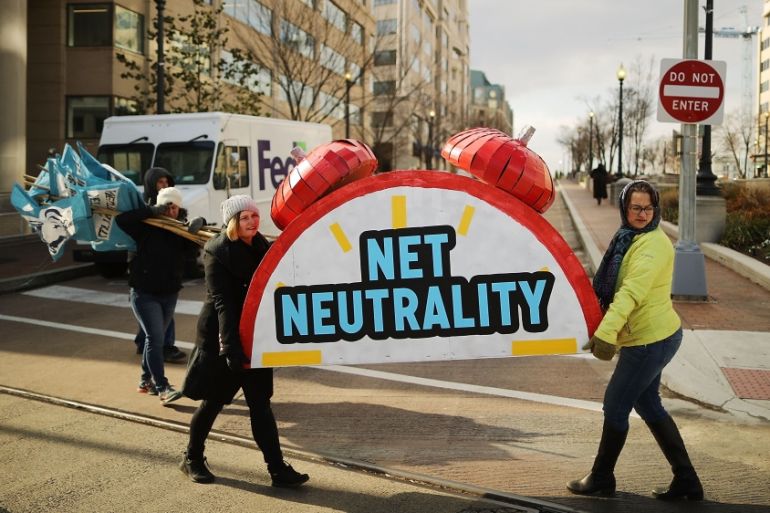FCC votes to repeal US net neutrality rules
Federal Communications Agency decision ends era of open internet, which required unbiased data protections in the US.

The Federal Communications Commission has voted to end the 2015 Open Internet Order which protects net neutrality in the United States.
The decision was taken during a much-anticipated meeting in Washington, DC, on Thursday.
Keep reading
list of 4 itemsCould shipping containers be the answer to Ghana’s housing crisis?
Are Chinese electric vehicles taking over the world?
First pig kidney in a human: Is this the future of transplants?
Net neutrality requires all internet service providers (ISPs) to treat all data equally, without blocking, “throttling” or censoring services or websites.
The vote – three Republican commissioners in favour, two Democrat commissioners against – enacts the Restoring Internet Freedom initiative, which is widely seen as giving ISPs greater power to limit internet access while favouring certain data streams.
Mignon Clyburn, an FCC commissioner and a former member of Congress who was appointed to the FCC by Barack Obama in 2009, said the vote signified a “norm where the majority [of FCC commissioners] ignores the will of the people” during arguments against ending net neutrality.
Public outcry against the vote to end net neutrality has been growing since Ajit Pai, who was appointed FCC chairman by President Donald Trump in January, announced the plans in late November.
Michael O’Rielly, a Republican commissioner appointed by Obama in 2013, said the concerns over the initiative’s impact were not based in fact but a “scary bedtime story for the children of telecom geeks”.
Still, the outcry motivated a number of legislators to call for a halt to the vote.
“Five Republican members of Congress … went on the record in calling for a halt to today’s vote,” Clyburn said.
‘Common sense’
Maine Senators Susan Collins, a Republican, and Angus King, Jr, an independent, both called on Thursday morning for the FCC to cancel the vote.
Citing a repeal of “common sense” that puts consumer rights and online innovation in jeopardy, the Senators said they believe a “more careful, deliberative process involving experts and the public” is necessary.
Clyburn read a statement from Jerry McNerney, a member of the House of Representatives from New Mexico, which said he dissented from this “legally lightweight and corporate-enabling” move.
“Pai’s move to gut net neutrality at the behest of big telecom is breathtaking in its total disregard for the public,” Mark Stanley Director of Communications for Demand Progress, which describes itsef as grass-roots civil-liberties group, said in a statement delivered to Al Jazeera.
Evan Greer, the Campaign Director of Fight for the Future, a pro-privacy, anti-censorship nonprofit, told Al Jazeera the FCC’s vote encourages ISPs “to monitor and sell their customer’s personal information to advertisers, control what websites and apps we use, engage in censorship, and charge us more money for less” internet.
Proponents’ views
Proponents of the end of the 2015 order said it would benefit consumers.
Kris Montieth, chief of the Wireline Competition Bureau (WCB), a part of the FCC which according to its website “works to ensure that all Americans have access to robust, affordable broadband,” said the repeal of the 2015 order will “empower Americans to choose the broadband internet access service that best meets their needs.”
The FCC is voting to ditch #NetNeutrality. What it means for you: pic.twitter.com/fpmuazGL5T
— AJ+ (@ajplus) December 14, 2017
Deborah Salons, an attorney with the WCB, said during the meeting that the vote would end the “heavy-handed, utility style” of the internet. The 2015 order’s reversal will the internet’s classification as a utility like water, theoretically allowing for throttling or blocking of content by ISPs.
Her comments echoed those of Pai, a former attorney for ISP Verizon, who said the end of net neutrality would be “pro-competitive”.
Free Press, another civil liberties organisation, told Al Jazeera they plan to take the FCC to court. The US Congress may also reverse the move, or enact new net neutrality rules.
“The fight to end net neutrality does not end today,” Clyburn said.
|
|